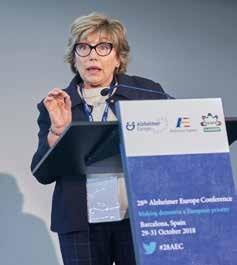
6 minute read
MOPEAD: shifting the paradigm to early diagnosis of Alzheimer’s disease
Annette Dumas, ASDM Consulting, Communication and Dissemination Work Package Co-Leader, and Mercè Boada, Fundació ACE, MOPEAD Coordinator share the achievements of the MOPEAD (Models Of Patient Engagement for Alzheimer’s Disease) project.
Despite evidence showing that the pathological process of Alzheimer’s disease (AD) starts many years before clinical symptoms appear and evidence about the economic and social value of early detection of AD, people with early AD (mild cognitive impairment (MCI) due to AD and mild AD dementia) remain outside of clinical settings and the diagnosis rates are low.
Advertisement
MOPEAD (Models Of Patient Engagement for Alzheimer’s Disease) is an Innovative Medicines Initiative-funded project contributing to the current drive to shift the paradigm to early diagnosis of AD. The project responds to the global community’s work towards the 2025 dementia goals articulated around four key areas: finding a disease-modifying therapy, living well with dementia, better care, and reducing the impact of dementia.
An innovative project
MOPEAD has been innovative in the sense that it has tested patient engagement models that have until now received little attention: two whereby citizens actively sought out a cognitive test: (RUN 1) Citizen Science – an online pre-screening tool, (RUN 2) Open House – pre-screening tests performed in a memory clinic without a physician’s referral, and two strategies testing patients at risk: (RUN 3) in primary care settings and (RUN 4) in type 2-diabetes / T2DM specialist settings. The persons identified to be at risk of AD were offered referral to a memory clinic for a full diagnostic assessment that they were free to accept or refuse. Five EU countries were represented in the project: Germany, Slovenia, Spain, Sweden and the Netherlands.
Screening results
For every ten at-risk individuals who were prescreened during the project, approximately six individuals with MCI due to AD/prodromal AD or dementia were identified. Out of the 2,847 pre-screened individuals, 972 screened positive and 398 were evaluated. In the end, 236 received an AD diagnosis.
In Spain, RUN 4 found a high prevalence of unknown cognitive impairment in T2DM patients. The Diabetes Specific Dementia Risk
Score was found to be a useful screening tool. The presence of associated comorbidities was the main factor for declining referral.
The results varied between countries. Some countries were more successful in pre-screening (Slovenia, followed by Spain). This can be attributed to having much higher numbers of pre-screened individuals in RUN 1 in these two countries.
Overall, more women participated in the pre-screening in all RUNs except for RUN 4. The percentage of individuals eventually diagnosed with MCI or dementia was higher for males in RUNs 1 and 2 while the percentage was higher for women in RUNs 3 and 4.
Screening costs
The screening cost per True Positive (TP) ranged between EUR 3,115 (RUN 1) and EUR 1,190 (RUN 4) (EUR 2,772 for RUN 2 and EUR 1,530 for RUN 3). The cost per screened individual ranged between EUR 103 (RUN 1) and EUR 2,204 (RUN 3) (EUR 212 for RUN 4 and EUR 1,338 for RUN 2).
The cost differences are attributed to the characteristics of the samples: RUNs 1 and 2 aimed at the general population (healthy subjects) while RUNs 3 and 4 aimed at a population at risk with concomitant comorbidities. More subjects need to be tested in RUNs 1 and 2.
There were big country-associated differences regarding the screening costs. RUNs 3 and 4
had lower costs per TP/screened population than RUNs 1 and 2. Nevertheless, the new diagnostic strategies (RUNs 1 and 2) may be valuable aft er modifi cations. For example, one challenge in RUN 1 was to get in touch with people who screened positive on-line, and in RUN 2, the cost-eff ectiveness may improve by integrating RUN 2-screening with diagnosis confi rmation at memory clinics.

Engagement of General Practitioners
Despite General practitioners (GPs) key role in identifying cognitive changes and diagnosing dementia at an early stage, MOPEAD partners experienced a mixed range of support when engaging GPs to support the project. To better understand their position, an ad-hoc survey was organised. It revealed that GPs are not opposed to early diagnosis which is predominantly considered to be of value. The results indicate a need for improved education about diagnostic procedures, suffi cient time and reimbursement. that at present there is no disease modifying aware that lifestyle improvement measures
The attitude towards currently available pharmacological and non-pharmacological treatments seems to aff ect the handling of early diagnosis.
Ethical considerations
An important step during the project was the disclosure of the diagnosis of MCI due to AD/ prodromal AD. The presentation of the results of clinical, neuropsychological tic support, were to be given both orally and in written form, including information to a close relative/caregiver. Referral to other hospital-based specialists or GP specialists was discussed in detail. Management of co-morbidities was generally recommended to be given by their GP specialist.
Mercè Boada presents MOPEAD at the 28th Alzheimer Europe Conference, Barcelona, October 2018
Finally, it was also important to advise individuals who did not get a diagnosis about follow-up options.
An ethically important part here is that pre-biomarker test counselling should be carried out. Biomarkers might give confl icting results. The patient should also be informed treatment available. But they should be made
and biomarker data, and the post-diagnos-
Acknowledgement
MOPEAD has received funding from the Innovative Medicines Initiative 2 Joint Undertaking under grant agreement No 115985. are always benefi cial and usually without negative side-eff ects.
The gender aspect
Women are disproportionately and increasingly aff ected by dementia, both as patients and carers. MOPEAD’s results indicate that there is sex and gender variation by country and by RUN. The variations between the four RUNs suggest that diff erent strategies may be more eff ective for men and for women respectively, which has implications for future studies and strategies.
MOPEAD confi rms the fi ndings established in the literature and indicate that sex and gender considerations must be included when developing and analysing tests to detect AD interventions to modify disease progression. Gender considerations must be systematically integrated into AD prevention, diagnosis treatment, care strategies and clinical research.
The Gender Policy Brief that was developed at the end of the project proposes some policy recommendations.
The way forward
MOPEAD’s educational material (Educational Leafl et, infographics, Tips for Coping, videos) was instrumental in raising awareness of AD, memory complaints, risks of cognitive decline and prevention strategies in the general population and can still be used. A number of publications have been produced to share information about the project and its results with a wider audience.
Tackling dementia and AD is an imperative that calls for robust policy action in the context of societal and economic challenges faced by the EU (ageing of the population, increase in the number of persons likely to be impacted by AD and the consequent increase in healthcare and social costs putting in danger the sustainability of the healthcare services). In this context, the project learnings motivated recommendations for policy makers and regulators and ideas for future public education and awareness-raising strategies. To access the resources MOPEAD has produced, visit https://
www.mopead.eu

https://www.mopead.eu @MopeadEU










